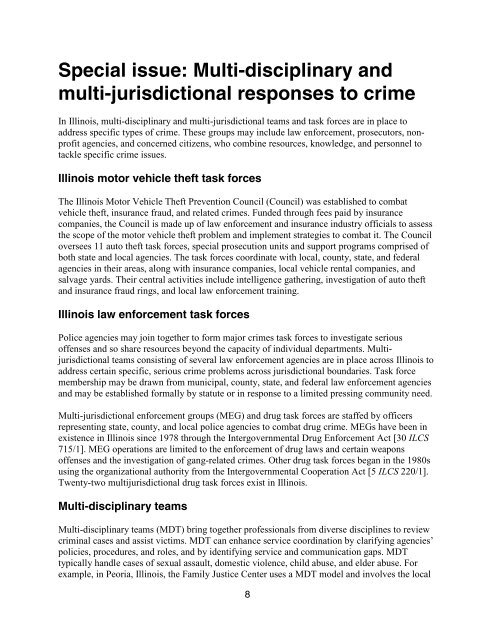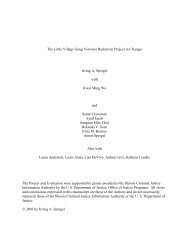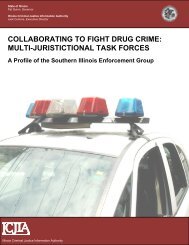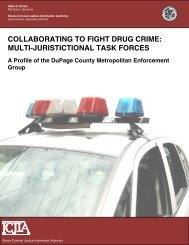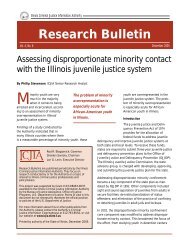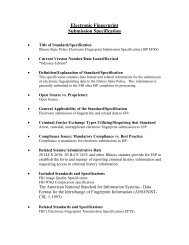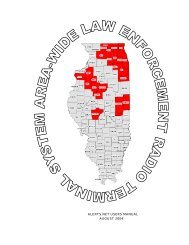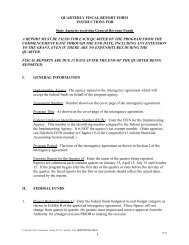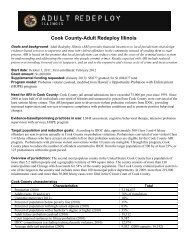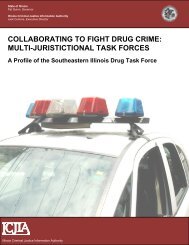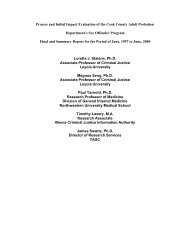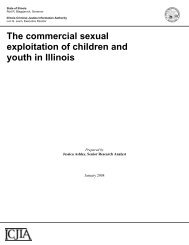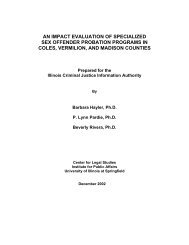policies and procedures of the illinois criminal justice system
policies and procedures of the illinois criminal justice system
policies and procedures of the illinois criminal justice system
Create successful ePaper yourself
Turn your PDF publications into a flip-book with our unique Google optimized e-Paper software.
Special issue: Multi-disciplinary <strong>and</strong><br />
multi-jurisdictional responses to crime<br />
In Illinois, multi-disciplinary <strong>and</strong> multi-jurisdictional teams <strong>and</strong> task forces are in place to<br />
address specific types <strong>of</strong> crime. These groups may include law enforcement, prosecutors, nonpr<strong>of</strong>it<br />
agencies, <strong>and</strong> concerned citizens, who combine resources, knowledge, <strong>and</strong> personnel to<br />
tackle specific crime issues.<br />
Illinois motor vehicle <strong>the</strong>ft task forces<br />
The Illinois Motor Vehicle Theft Prevention Council (Council) was established to combat<br />
vehicle <strong>the</strong>ft, insurance fraud, <strong>and</strong> related crimes. Funded through fees paid by insurance<br />
companies, <strong>the</strong> Council is made up <strong>of</strong> law enforcement <strong>and</strong> insurance industry <strong>of</strong>ficials to assess<br />
<strong>the</strong> scope <strong>of</strong> <strong>the</strong> motor vehicle <strong>the</strong>ft problem <strong>and</strong> implement strategies to combat it. The Council<br />
oversees 11 auto <strong>the</strong>ft task forces, special prosecution units <strong>and</strong> support programs comprised <strong>of</strong><br />
both state <strong>and</strong> local agencies. The task forces coordinate with local, county, state, <strong>and</strong> federal<br />
agencies in <strong>the</strong>ir areas, along with insurance companies, local vehicle rental companies, <strong>and</strong><br />
salvage yards. Their central activities include intelligence ga<strong>the</strong>ring, investigation <strong>of</strong> auto <strong>the</strong>ft<br />
<strong>and</strong> insurance fraud rings, <strong>and</strong> local law enforcement training.<br />
Illinois law enforcement task forces<br />
Police agencies may join toge<strong>the</strong>r to form major crimes task forces to investigate serious<br />
<strong>of</strong>fenses <strong>and</strong> so share resources beyond <strong>the</strong> capacity <strong>of</strong> individual departments. Multijurisdictional<br />
teams consisting <strong>of</strong> several law enforcement agencies are in place across Illinois to<br />
address certain specific, serious crime problems across jurisdictional boundaries. Task force<br />
membership may be drawn from municipal, county, state, <strong>and</strong> federal law enforcement agencies<br />
<strong>and</strong> may be established formally by statute or in response to a limited pressing community need.<br />
Multi-jurisdictional enforcement groups (MEG) <strong>and</strong> drug task forces are staffed by <strong>of</strong>ficers<br />
representing state, county, <strong>and</strong> local police agencies to combat drug crime. MEGs have been in<br />
existence in Illinois since 1978 through <strong>the</strong> Intergovernmental Drug Enforcement Act [30 ILCS<br />
715/1]. MEG operations are limited to <strong>the</strong> enforcement <strong>of</strong> drug laws <strong>and</strong> certain weapons<br />
<strong>of</strong>fenses <strong>and</strong> <strong>the</strong> investigation <strong>of</strong> gang-related crimes. O<strong>the</strong>r drug task forces began in <strong>the</strong> 1980s<br />
using <strong>the</strong> organizational authority from <strong>the</strong> Intergovernmental Cooperation Act [5 ILCS 220/1].<br />
Twenty-two multijurisdictional drug task forces exist in Illinois.<br />
Multi-disciplinary teams<br />
Multi-disciplinary teams (MDT) bring toge<strong>the</strong>r pr<strong>of</strong>essionals from diverse disciplines to review<br />
<strong>criminal</strong> cases <strong>and</strong> assist victims. MDT can enhance service coordination by clarifying agencies’<br />
<strong>policies</strong>, <strong>procedures</strong>, <strong>and</strong> roles, <strong>and</strong> by identifying service <strong>and</strong> communication gaps. MDT<br />
typically h<strong>and</strong>le cases <strong>of</strong> sexual assault, domestic violence, child abuse, <strong>and</strong> elder abuse. For<br />
example, in Peoria, Illinois, <strong>the</strong> Family Justice Center uses a MDT model <strong>and</strong> involves <strong>the</strong> local<br />
8


